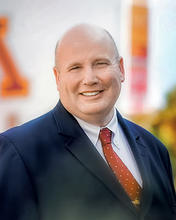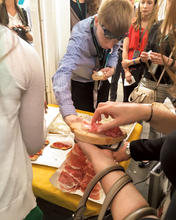
The Business of Food: A Commitment to Food Education
Friday, November 4, 2016
“I see an enormous role for business schools to train the people to have the skills to determine what people really want and translate that into marketing plans and products,” says Greg Page, recently retired CEO of Cargill.
It may not at first seem obvious that agriculture and a school of management are a natural pairing, but it turns out it may be the most synergistic pairing of all, especially for the Carlson School.
To begin with, most of modern economics, starting with Adam Smith’s 1776 seminal "Wealth of Nations," used agriculture and its products as foundations of market formation and trade. Flash forward 240 years later and we see interactions with finance, strategy, and pricing critical for many of Minnesota’s most global firms. Start with General Mills. This firm has been a destination for the Carlson School’s best and brightest students from undergraduate and graduate programs for generations. Since 2009, it has hired 72 Carlson MBA and HRIR students alone. Whether it be for brand management, strategic pricing, or global supply chain optimization, the links between agribusiness and management are clear. Next is CHS, another destination for the Carlson School’s best students with a focus on harmonizing the competing agribusiness output for food and energy stocks. Minnesota also has many progressive agribusiness companies looking for similar talent.
“The needs our employers are increasingly expressing for talent acquisition have significant industry sector components,” says MBA Programs Assistant Dean Phil Miller, ’97 MBA. “In the food and ag sector, it is often not enough to just know the sector or a function. You need to combine strategic, cross-functional thinking with deep knowledge of things like commodity markets of agriculture-specific supply chains.”
To address these needs the Carlson School is featuring a dual degree MBA with the College of Food, Agricultural and Natural Resource Sciences’ (CFANS) Applied Economics master’s program starting this fall.
“Developing deeper programming and engagement in regionally and globally important industry sectors has been a priority for the Carlson School,” Miller says. “Food and agribusiness is a sector with both great University of Minnesota depth and importance across multiple colleges. The Carlson School has a growing partnership with CFANS and this dual degree is a natural outgrowth of that partnership,” Miller says. Cross-University collaboration is critical to future success. What the larger University can accomplish collectively is often greater than what any single college can do on its own.
A degree across colleges
The dual degree brings together the best of the Carlson School’s graduate management curriculum in the MBA program with CFANS’ applied economics curriculum to build a program that will develop leaders in the food and agriculture sector. “The sector has an aging workforce and at times struggles to attract talent with the required skills and knowledge to have immediate impact. The University of Minnesota is seeking to address this gap,” Miller says.
In addition to the dual-degree program, the Carlson School will offer an agribusiness MBA specialization modeled after the school’s 10-year success with hundreds of graduates through its medical industry specialization.
These initiatives were guided by the school’s leadership listening to the human capital needs of agribusiness commodity giant Cargill and innovator Mosaic. In discussions with these firms, Associate Dean for MBA and MS programs Steve Parente heard “excellence in general management training is not sufficient for the next generation of agribusiness leaders.”
“Future leaders need high competence in finance, applied economics, strategic pricing, and a deep knowledge of the agribusiness supply chain to sustain and advance this critical global industry,” he says. “The Carlson School is uniquely positioned to be a critical education partner to the global agribusiness community as the new MBA initiatives are complemented by an MS in supply chain program, which also began this fall.”
The MS in Supply Chain Management program is a one-year graduate degree for working professionals seeking leadership roles in the field. The curriculum includes coursework in food and ag (farm to fork), negotiations, quality and security, logistics and transportation, data analytics, and other areas relevant to agribusiness.
“These three new programs should provide a trifecta of new graduate program opportunities to train and advance the next generation of global leaders in agriculture,” Parente says.
In getting its feet wet in anticipation of these new programs, the Carlson School partnered with CFANS in the spring to offer the first joint elective specifically for students interested in food and agriculture—a “Food and Agribusiness Marketplace” overview/survey course. The course was taught by Professor Michael Boland of the University’s Department of Applied Economics.
About one-third of the 35-member class were CFANS students and the rest were from the Carlson School. “It’s been a real nice blend of social scientists and physical scientists,” Boland says. “We had full attendance with a waiting list for the first semester. That’s a good sign.”
Actually, Boland says students were clamoring for the class. “We have this master’s program with a lot of persons interested in food. They wanted a class that integrates a number of topics like public health, nutrition, animal welfare, trade agreements, agricultural development. A lot of students wanted a broad survey-type class with exposure to issues including climate change and global warming,” he says. “People are curious about food these days. There is more interest in food labels, what you eat, what is going on overseas, and how we are going to feed this huge population. A lot of people want to know about the bigger world today.”
Boland himself is pleased with the class, especially with the collaboration between the Carlson School and CFANS. “Offering this class is a big thing. We’ve had our undergraduate students taking a Carlson minor for years. We are glad to offer a class with an agricultural focus for MBA students. We hope to build additional coursework in food and sustainability and foster a collaborative learning environment for the benefit of students in both colleges,” he says.
The class is good for the students, too. “Employers need to see that students have had the experience with both sides,” Boland says.
Food, the universal language
These new classes are by no means the Carlson School’s first excursion into food education. Many classes have food-related items baked right into the curriculum. In Senior Lecturer Jay Lipe’s IBUS 4082W Brand Management class, Undergraduate Program Senior Academic Advisor Kathy Evenson-McDermott taught a lesson on the Slow Food Movement and its late-1980s origin in Italy. “It is a return to cooking in the old way, using traditional and artisan methods to prepare food—and allowing time to work its magic—as well as taking time to sit down and enjoy the food with family and friends,” she says. “We learned about the example of ricotta being aged in wooden forms on a farm in Italy, and how there is bacteria that this wood develops that greatly enriches the flavor of the cheese.”
The class learned how Slow Food is much like a luxury good in that it is made in small quantities, takes time, is of a very high quality, and has detailed craftsmanship behind it. “The food is local in that it is produced by farmers and producers who live in the region and either grow it themselves or work directly with the grower,” Evenson-McDermott says. “The lesson tied in well to the full class as Jay was using a video from Italian chef Massimo Bottura and how he repurposed parmesan wheels that had broken after an earthquake in 2012 into a risotto. Massimo is all about using food and ingredients to their fullest and not letting anything be forgotten.” The class segment really paid off as the students embarked to Italy to see the Slow Food Movement at work in the land of its birth. “They participated in a cooking class in Florence to better understand the Slow Food process, making chicken cacciatore, pappa al pomodoro [tomato bread soup] and a trifle for dessert. The students were taught to see how each ingredient contributes to the whole recipe and were encouraged to stop and taste their cooking to check it. They really had fun with this.”

